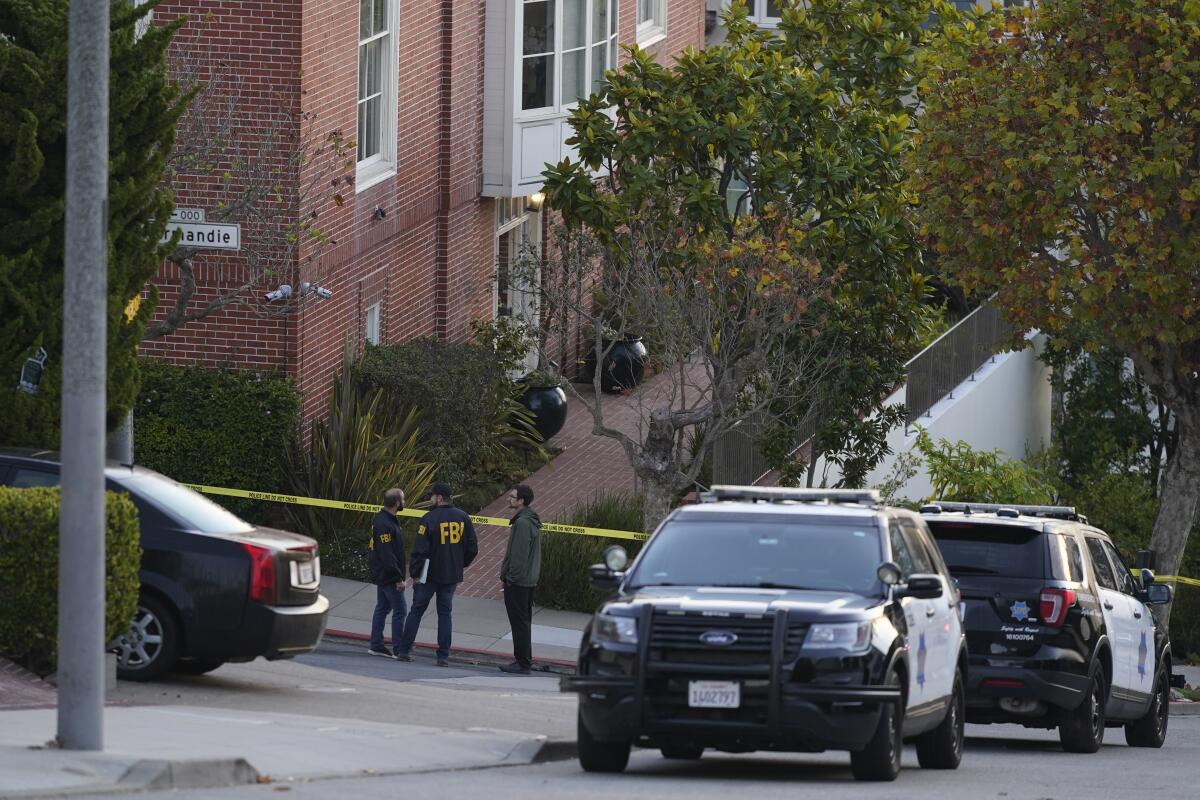Editorial: The horrifying attack on Paul Pelosi is an attack on democracy

- Share via
America is now a nation where acts of political violence are so predictable that for months before an assailant broke into the San Francisco home of House Speaker Nancy Pelosi and attacked her husband, Paul Pelosi, on Friday, experts have warned such an incident was likely.
“Politically catalyzed violence should be expected to rise with the election calendar and to fall between campaigns,” Rachel Kleinfeld, a senior fellow at the Carnegie Endowment, said in testimony to Congress in March.
In August, two counterterrorism experts at Georgetown wrote that “with a midterm around the corner, a former president under investigation, and major upheavals occurring on hot-button issues such as abortion and gun control, extremists inclined to violence will be increasingly likely to lash out.”
And earlier this month, Republican Sen. Susan Collins of Maine told the New York Times that threats of violence against members of Congress have become so intense that “I wouldn’t be surprised if a senator or House member were killed.”
Public officials, and their families, should not have to live with this level of fear. It is horrific that campaign season has become a time of violence and threats rather than healthy debate about the issues.
Far-right political figures are telling their followers, if we lose, you’ve been cheated, a message that many seem to think makes ‘revolution’ justified even before votes have been cast.
Democrat Nancy Pelosi was in Washington, D.C., when the intruder broke into her San Francisco home shouting, “Where is Nancy? Where is Nancy?” before attacking her husband with a hammer, fracturing his skull and seriously injuring his arm. Police booked David DePape — who reportedly said he was “waiting for Nancy” after police arrived at the Pelosi home — on suspicion of several crimes, including attempted homicide and assault with a deadly weapon.
A Times review of DePape’s online presence shows he was engaged in spreading far-right conspiracies, spewing antisemitism, hate and bizarre QAnon screeds and posting videos from Donald Trump supporters pushing the bogus claim that the 2020 election was stolen.
Yes, occasional political violence across the ideological spectrum is as old as America itself. What’s different now is the frequency. In the five years after Trump was elected president in 2016, recorded threats against members of Congress rose more than tenfold, to 9,625 in 2021, according to a New York Times analysis of figures from the Capitol Police.
On Friday, a man pleaded guilty to threatening to kill Rep. Eric Swalwell (D-Dublin) and his staff. Earlier this summer, a man tried to stab New York gubernatorial candidate Lee Zeldin, a Republican congressman, during a July campaign event, and an armed man was arrested on suspicion of threatening to kill Democratic Rep. Pramila Jayapal outside her Seattle home.
A Simi Valley man was arrested near the Maryland home of Justice Brett M. Kavanaugh in June after he flew across the country with a black tactical vest, a Glock 17 pistol and, according to authorities, a plan to harm the Supreme Court justice. In August, two men were convicted of conspiring to kidnap Michigan Gov. Gretchen Whitmer in a plot that involved obtaining a bomb to blow up a bridge and thwart police.
And in May, two Northern California men pleaded guilty to plotting to blow up the state Democratic Party’s headquarters in Sacramento in a scheme prosecutors described as politically motivated by Trump’s 2020 loss.
Republicans who believe that the 2020 election was stolen from Trump and that Joe Biden is an illegitimate president are “substantially more likely” than other Americans to believe that violence is justified to advance political objectives, according to a new study by the UC Davis Violence Prevention Research Program.
“They are more likely to hold extreme and racist beliefs, to endorse political violence, to see such violence as likely to occur, and to predict that they will be armed under circumstances in which they consider political violence to be justified,” the authors wrote.
This trend is a stain on the nation and something leaders of all kinds — political, religious, community and cultural — must work to reverse. Violence against public officials and their families is the mark of an undemocratic society.
More to Read
A cure for the common opinion
Get thought-provoking perspectives with our weekly newsletter.
You may occasionally receive promotional content from the Los Angeles Times.











